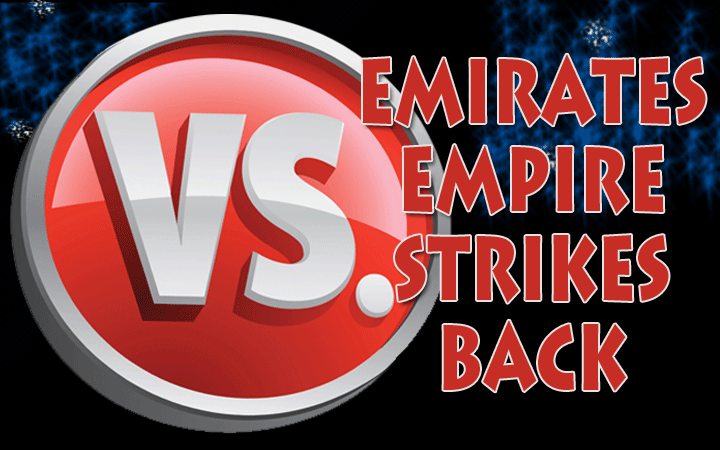
For
some time now the question of whether or not Dubai-based Emirates Airline
receives subsidies has been a hot button issue.
The “Partnership for Open and Fair
Skies Coalition,” a group representing Delta Airlines (DL), United
Airlines (UA), and American Airlines (AA), has called on U.S. regulators
to provide a level playing field and halt the expansion of the Gulf carriers.
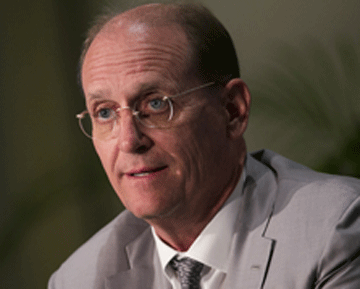 Although Etihad (EY) and Qatar Airways (QR)
are involved as well, sources say the main target driving the coalition
is Emirates (EK), which has emerged as a leading carrier, aircraft buyer,
and employer of people in commercial aviation.
Although Etihad (EY) and Qatar Airways (QR)
are involved as well, sources say the main target driving the coalition
is Emirates (EK), which has emerged as a leading carrier, aircraft buyer,
and employer of people in commercial aviation.
Delta CEO Richard Anderson (right) has been
campaigning for the replacement of Open Skies with a “Fair Skies”
policy, which would take into consideration disparities in income taxes,
labor laws, and subsidies when creating bilateral agreements.
“We are broadly in favor of Open Skies—
but we’re in favor of Fair Skies.”
“A number of those carriers are not
airlines, they are governments.
“They have huge subsidies and structural
advantages,” Mr. Anderson said.
European carriers, namely AF/KLM and LH,
have brought similar allegations forward.
In December, Lufthansa and Air France-KLM
Royal Dutch Airlines wrote a joint letter to the European Commission asking
it to take steps against the Middle Eastern carriers, accusing them of
distorting the market by virtue of their alleged state subsidization.
Jean-Cyril Spinetta, (left) the honorary
chairman of the Air France-KLM Group said, “If you compete with
[Gulf carriers] in an open sky situation, it’s sort of suicide.
“It means European airlines will disappear.”
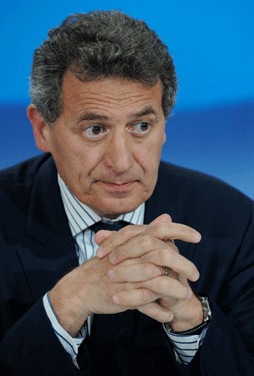 But
in Europe, as in the USA, opinions are divided. But
in Europe, as in the USA, opinions are divided.
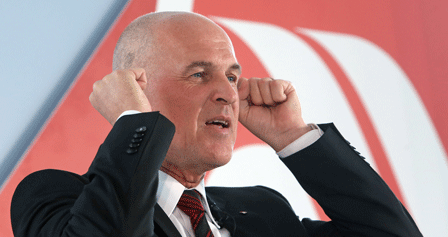 “We see no future in a protectionist
aviation policy in Europe,” said Air Berlin’s CEO Stefan Pichler
(above right).
“We see no future in a protectionist
aviation policy in Europe,” said Air Berlin’s CEO Stefan Pichler
(above right).
Air Berlin (AB), it should be mentioned,
is the cash-strapped, second-largest German legacy carrier, which has
received huge cash infusions from its major shareholder, Etihad.
In the USA, a consumer advocacy group called
Travelers United as well as aircraft manufacturer Boeing and FedEx have
sided with EK, EY, and QR.
FedEx CEO David Bronczek accused the U.S.
carriers of being motivated in their call for action against EK and others
out of a fear of competing with them.
The Empire Strikes Back
Now Emirates Airlines (EK) has issued a 200+
page document outlining its position. The Emirates manifesto submitted
to U.S. regulators has also been launched out to the world aboard the
EK website.
Although EK calls for moderation in the
discussion about subsidization, the airline is not shy of defending its
position.
“U.S. legacy carriers got the facts
wrong, got the law wrong, and set their sights on an outcome that will
be wrong for American consumers, communities, and the national economy,”
Emirates insists.
A “protectionist bid to restrict consumer
choice” and words like “discrediting Emirates” jump
off the page of the Emirates first paragraph, which concludes with, “U.S.
legacy carriers built their case on wrong legal standards, asking the
U.S. government to act against the law by imposing a unilateral freeze.
“The Big 3’s white paper is
littered with self-serving rhetoric about ‘fair trade,’ ‘level
playing field,’ and ‘saving jobs,’ but their mess of
legal distortions and factual errors falls apart at the slightest scrutiny”;
“bullyboy tactics and browbeating,” Emirates insists.
Who Got It
Right?
Looking at the situation at arm’s
length is revealing.
The Emirates document just released reveals,
among other things, that certain losses resulting from fuel hedging options
going wrong were transferred to EK’s main stockholder Investment
Corporation of Dubai (ICD) during the 2008/2009 accounting period, with
the purpose of “not presenting a misleading portrayal of EK operations
by means of paper losses under ‘mark to market’ accounting,”
highlighting that ultimately all resulting payments from these contracts
were paid by EK using its own cash and no losses were absorbed by either
ICD or the Dubai government.
“The ability to transfer accounting
losses to a 3rd entity, no matter who ultimately paid the resulting monies,
certainly falls clearly under the category of an advantage,” a source
told FlyingTypers.
A Matter
of Interpretation
Taking a broader view, in a world of many
languages and opinions, it can be reasoned that a large portion of the
claims and counterclaims here center on interpretation regarding the Word
Trade Organization’s (WTO) “Agreement on Subsidies and Countervailing
Measures” (SCM agreement) and whether SCM applies to (air) services
or is covered in the WTO’s General Agreement on Trade in Services
(GATS).
“Where EK accuses the U.S. legacy
carriers of ‘framing their complaint in terms of their own narrow
interests,’ it must be said that commercial interests are naturally
limited to the narrow scope of one’s own activities, and rightly
so—a commercial enterprise is for profit, and any other behavior
would not be condoned by shareholders,” our source said.
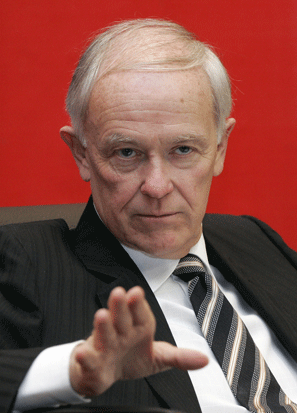 “Emirates
tact of interpreting bankruptcy restructuring under the strict terms of
Chapter 11 (and the subsequent ability to shed considerable debt under
certain circumstances) as a subsidy received by US carriers, does not
comply with the intent and the interpretation of applicable U.S. law.” “Emirates
tact of interpreting bankruptcy restructuring under the strict terms of
Chapter 11 (and the subsequent ability to shed considerable debt under
certain circumstances) as a subsidy received by US carriers, does not
comply with the intent and the interpretation of applicable U.S. law.”
In the Emirates document, Sir Tim Clark,
CEO of EK, states:
“We have been profitable for 27 years
straight, and unlike our accusers, we have never depended on government
bail-outs or protection from competition.
“In fact, we were told right from
the start by the government of Dubai that Emirates has to deliver profits
and stand on its own feet.” That statement by the esteemed Clark
may not be wrong—but, alas, it is also not the complete picture.
“It is not unfair to conclude here
that EK’s case may not be as rock-solid and strong as they may want
the public—and even more, the industry—to believe,”
another FT source said.
Then there is the jobs creation question.
In their calculations of how many jobs EK
has created in the markets they serve, no one—not even the U.S.
carriers—has ever denied that EK has created a multitude of jobs.
But isn’t the question really: Have
these jobs been created at a disadvantage for the home carriers, e.g.
would these jobs likewise exist if Emirates had not stepped into these
markets, and would the home carriers possibly employ more staff if EK
and others hadn’t?
While to date it is unclear which side will
ultimately gain the upper hand when a decision comes down in all of this,
it seems certain, at this point, the sure winners are the law firms and
lobbyists.
At the heart of the matter there seems to
be little room, if any, for compromise, as both EK and the U.S. legacy
carriers have a number of points to make.
Brett Snyder in his blog “Cranky Flier”
writes:
“The real issue is in fifth freedom
flights.
“Of the freedoms of the air, the fifth
is becoming one of the more controversial.
“Emirates isn’t flying Dubai-Milan-New
York because it can’t fly it nonstop.
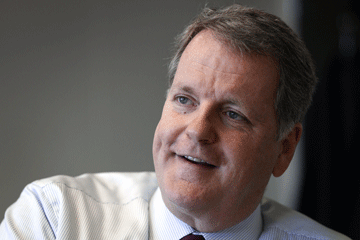 “(EK)
flies (the route) because it thinks it can undercut everyone else in the
market and use low costs to its advantage.” “(EK)
flies (the route) because it thinks it can undercut everyone else in the
market and use low costs to its advantage.”
“If you think about it, [in Open Skies]
the Gulf carriers could fly from Dubai to pretty much anywhere in Asia
or Europe and then on to the U.S., causing serious damage to the U.S.
carriers,” Cranky Flier said.
American Airlines CEO Doug Parker (right)
spoke about the Emirates service from New York to Milan:
“I know enough about this business to know
you can't launch A380s from Milan to JFK. I don't care what your cost
structure is, there's no possible way you can generate enough revenue
on the route to pay the cost of flying that airplane over."
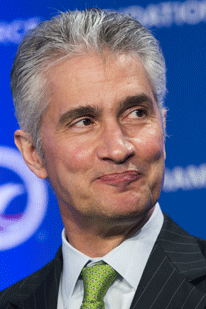 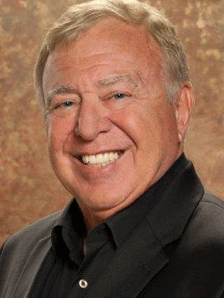 “It’s
hard to see the U.S. overturning the Emirates initiative to build its
airline company,” said TIACA Hall of Famer and Middle East expert
Bill Boesch (right). “It’s
hard to see the U.S. overturning the Emirates initiative to build its
airline company,” said TIACA Hall of Famer and Middle East expert
Bill Boesch (right).
“The U.S. has powerful military interests
in the Middle East that are being served via the Gulf States, which could
hold sway in any decision in favor of the U.S. airlines.”
All of this has not been without its lighter
moments either.
Asked how he feels about working so closely
with the top executives of American and Delta, United’s CEO Jeff
Smisek (left) said:
That’s easy. I hate these guys. And
they hate me.”
Geoffrey/Jens/Flossie
|





